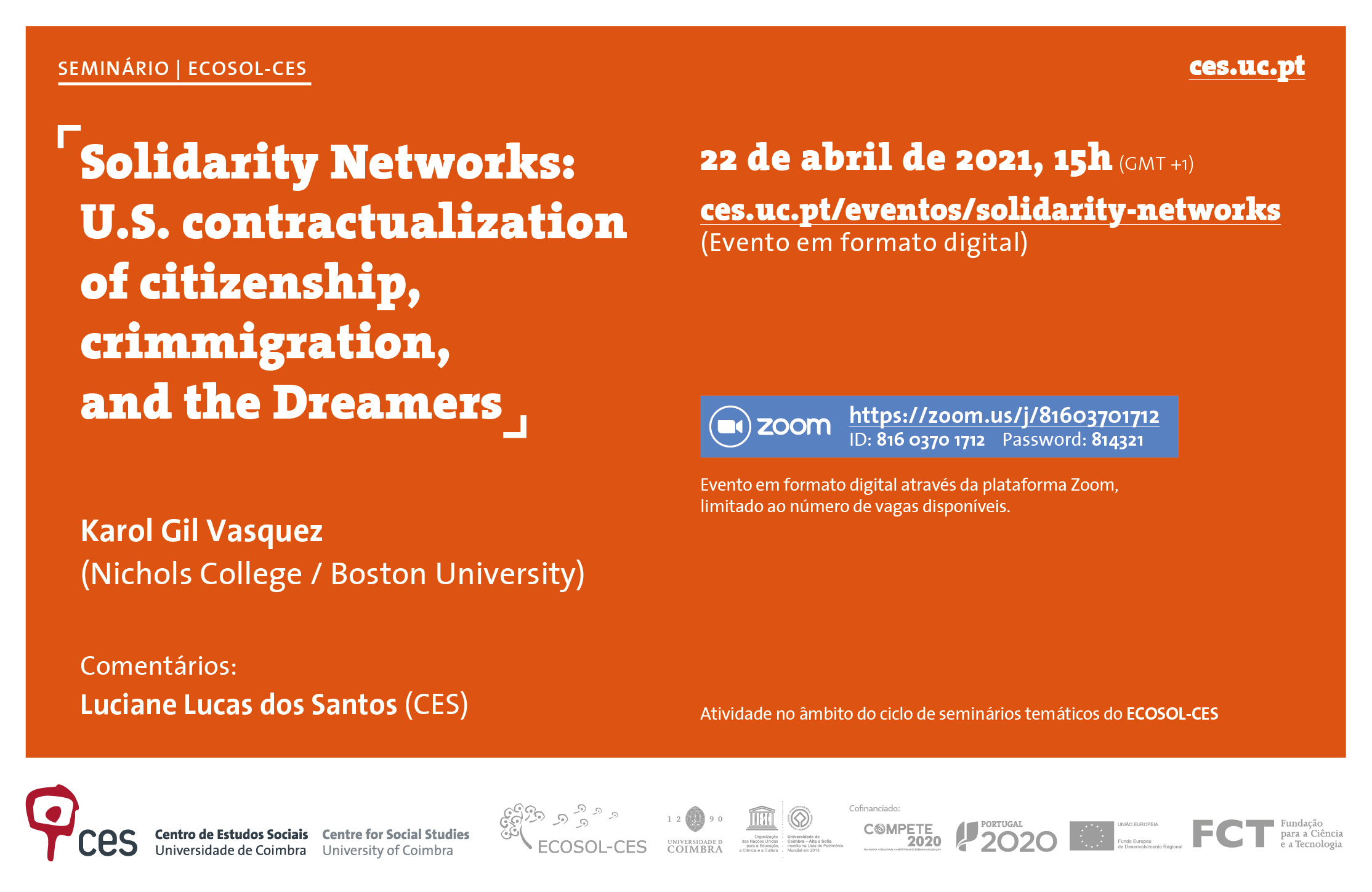Seminário | ECOSOL-CES
Solidarity Networks: U.S. contractualization of citizenship, crimmigration, and the Dreamers
Karol Gil Vasquez (Nichols College / Boston University.)
22 de abril de 2021, 15h00 (GMT +01:00)
Evento em formato digital
Comentários: Luciane Lucas dos Santos (CES)
Apresentação
A “zero-tolerance” immigration policy is an integral part of the United States’ political economy. The immigrant “question” is politicized, as its push and pull factors vanish in the midst of xenophobia. This article provides an institutional perspective to study contemporary immigration. It approaches the U.S. immigrant “question” from a regional Great Transformation perspective by interpolating the ideas of labor commodification and citizenship’s contractualization. The shift towards criminalizing unauthorized immigrants illustrates the commodifying path to obtain citizenship. Immigrant struggles unfold a Double Movement. A social force that recreates an alternative notion of citizenship, in an attempt to re-embed the economy into its social fabric by emphasizing the need to reconstruct the social contract’s non-contractual nature.
Nota biográfica
Karol Gil Vasquez was born in Mexico City. She earned her bachelor’s degree in Economics and Political Science as well as her Master of Arts in Sociology from the University of Central Missouri in 2007. Her thesis titled “El Otro Lado: Immigration, Social Networks, and the Labor Market of Mexican Migrants in Missouri” analyzes early waves of irregular immigration coming from rural Mexico into U.S. small towns in the Midwest. In 2013, Karol obtained her PhD in Economics from the University of Missouri-Kansas City (UMKC). During her doctoral studies, Karol collaborates as a researcher for UMKC-Institute for Human Development and participated in the design and publication of the 2013 Hispanic Needs Assessment, a comprehensive study that delves into the conditions of Hispanic immigrants living in the Kansas City metropolitan area. Currently, Karol is an assistant professor of economics at Nichols College and instructor at Boston University. Her research topics include the following: Feminist Economics, Social and Solidarity Economics, Latin American and Middle East Studies, Postcolonial Studies, Social Currencies, Immigration Studies and the Political Economy of Violence and Crime. Her scholarly contributions have been presented at conferences around the world and published in peer-reviewed journals, books, and newspapers. In 2019, the article, titled “Bolivia’s Institutional Transformation: Contact Zones, Social Movements and the Emergence of an Ethnic Class Consciousness,” is awarded the Editor’s Prize from the Journal of Economic Issues. Karol considers herself an economist, and an anthropologist at heart.
____________________
Esta atividade realiza-se através da plataforma Zoom, sem inscrição obrigatória. No entanto, está limitada ao número de vagas disponíveis.
https://us02web.zoom.us/j/81603701712?pwd=YURFalBJQWNmS2tpRDg5UEJUdnpndz09
ID da reunião: 816 0370 1712 | Senha de acesso: 814321
Agradecemos que todas/os as/os participantes mantenham o microfone silenciado até ao momento do debate. A/O anfitriã/ão da sessão reserva-se o direito de expulsão da/o participante que não respeite as normas da sala.
As atividades abertas dinamizadas em formato digital, como esta, não conferem declaração de participação uma vez que tal documento apenas será facultado em eventos que prevejam registo prévio e acesso controlado.


